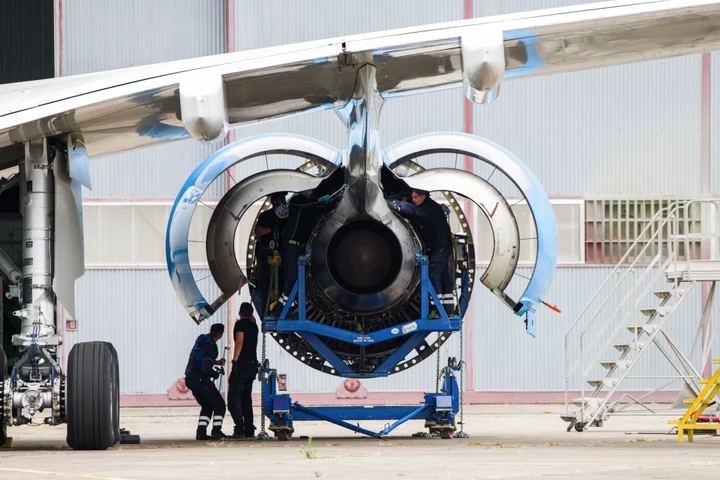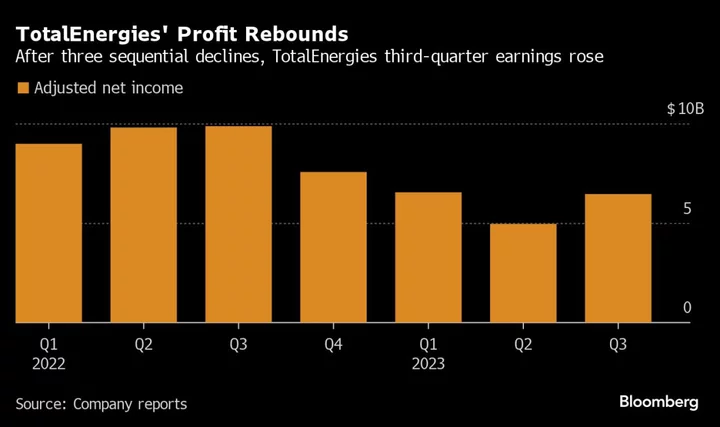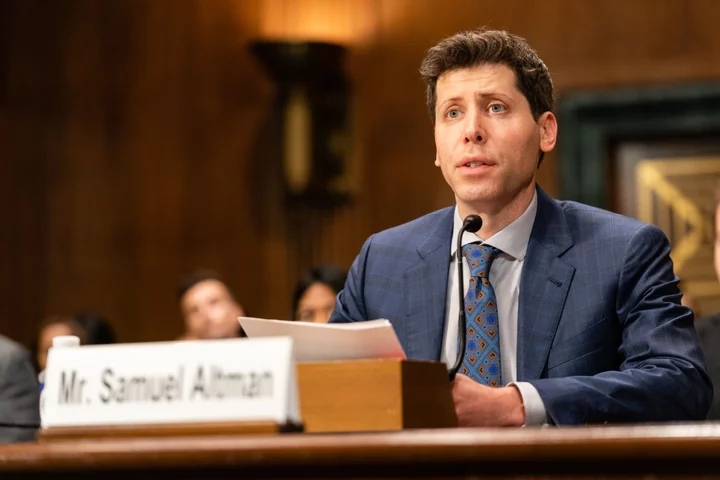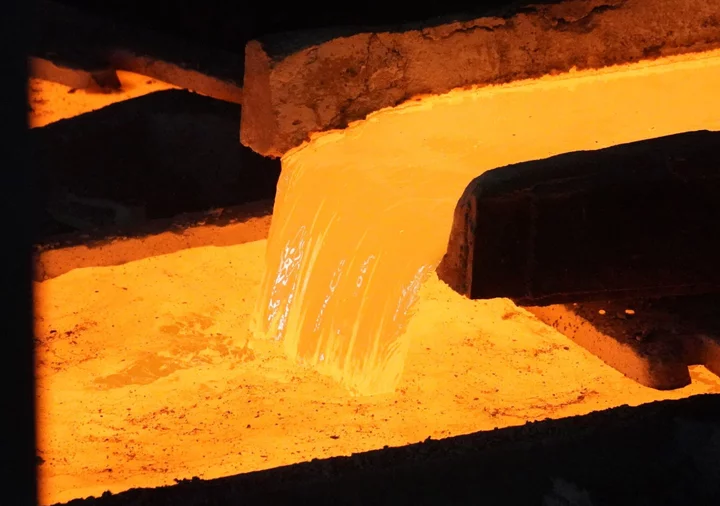European aviation regulators have determined that an obscure London-based company supplied bogus parts for repairs of jet engines that power many older-generation Airbus SE A320 and Boeing Co. 737 planes.
Manufacturing partners General Electric Co. and Safran SA have been assisting in the probe of allegedly faked certification documents and unapproved parts for CFM56 engines that were distributed by London-based AOG Technics Ltd., according to the companies, public regulatory filings and letters to operators viewed by Bloomberg.
“Numerous Authorised Release Certificates for parts supplied via AOG Technics have been forged,” the European Union Aviation Safety Agency said in a statement in response to Bloomberg queries. In each case, the organization identified as the manufacturer “confirmed that they did not produce the certificate, and that they were not the originator of the part,” EASA said.
The spread of undocumented or potentially faked parts into the engine supply chain is rare and treated with utmost urgency in an industry where every component requires verified provenance to ensure aircraft safety — it’s impossible to know whether uncertified parts will be as durable under stress. Manufacturers and regulators sounded the alarm weeks ago, triggering a global scramble to trace parts supplied by AOG Technics and identify affected aircraft.
It’s unclear how many fake parts may have been installed or how many aircraft might be affected. The CFM56, the world’s best-selling jet engine, is installed on thousands of narrow-body planes that are a staple of the global fleet.
EASA told operators this month to quarantine parts that are backed by false documentation. It said Thursday that to date, AOG Technics had failed to provide detail on the actual origin of the questionable parts.
“The documentation of parts is a very critical issue,” said Klaus Mueller, a senior advisor at AeroDynamic Advisory and a former senior executive at MTU Aero Engines AG and Deutsche Lufthansa AG’s maintenance arm. “The industry is taking this topic very, very seriously.”
Regulator Warnings
Third-party companies like AOG Technics supply parts to engine-repair shops working on in-service commercial aircraft. New engines from CFM International, the GE-Safran manufacturing venture, wouldn’t be affected by the issue, nor would the CFM56’s successor, the CFM Leap, which is used on the latest A320neo and 737 Max narrowbodies.
The UK’s Civil Aviation Authority said in an Aug. 4 safety notice that it was investigating “a large number of Suspect Unapproved Parts” supplied through AOG Technics. Some components with false airworthiness release certificates were found on engines fitted to aircraft registered in the UK, the filing said.
CFM has unearthed 72 falsified airworthiness certification documents spanning 50 part numbers supplied by AOG Technics for the CFM56, according to a spokesman for the manufacturer. Two falsified documents for components of GE’s CF6 engine, an earlier wide-body powerplant, were also found, he said.
“We proactively alerted our customers and maintenance shops, and we continue to work with our customers to assess the authenticity of documentation for parts they acquired directly or indirectly from AOG Technics,” CFM said in response to Bloomberg queries.
Cease-and-Desist
The company at the center of the controversy isn’t an approved vendor for CFM or GE, the CFM spokesman said. GE and Safran each sent cease-and-desist letters to AOG Technics, he said.
AOG Technics didn’t respond to calls and messages from Bloomberg. Its website describes the company as a “leading global aircraft support provider” and a source of new and “serviceable” parts for a variety of engines that power 737 and A320 models. The company said it had warehouse operations in London, Frankfurt, Miami and Singapore.
According to the UK’s Companies House website, AOG Technics was incorporated in 2015 and is majority owned by 35-year-old Jose Zamora Yrala, whose nationality is listed as British on some forms and Venezuelan on others. The company listed current assets of £2.58 million ($3.27 million) as of February 2022. Bloomberg News was unable to reach Yrala.
Letters to Operators
In a July 28 letter to all CFM56 customers that was seen by Bloomberg, CFM said Paris-based Safran had filed suspected unapproved parts notifications with EASA after a maintenance shop questioned the authenticity of documents provided by AOG Technics for a new CFM56 part.
After determining the document was falsified, CFM and the engine shop searched through other records provided by AOG and found “significant discrepancies” with EASA certificates and shipment documents, according to the letter.
Three days later, GE sent a separate “All Operators Wire” to CF6 customers and maintenance shops, alerting them to “a recently identified falsified certification document” related to the sale of several CF6 engine parts with the same part number. The information was shared “as a precaution while GE and FAA investigations progress,” the letter said.
Europe’s regulator issued its notice of suspected unapproved parts days later, asking aircraft owners, operators, maintenance organizations and parts distributors to inspect their records for parts obtained directly or indirectly from the London firm.
“If a part with a falsified ARC is already installed, then it is recommended that the part be replaced with an approved part,” EASA’s Aug. 4 filing said, referring to the authorized release certificate which identifies the approved originator of the part. It added that the European safety agency “might take further action” as a result of the ongoing investigations.
An EASA official said Wednesday that the agency was continuing to monitor responses to determine whether any further actions were needed.
The UK’s CAA had no immediate comment. The FAA didn’t respond to requests for comment.
--With assistance from Alan Levin.
Author: Julie Johnsson, Ryan Beene and Siddharth Philip









